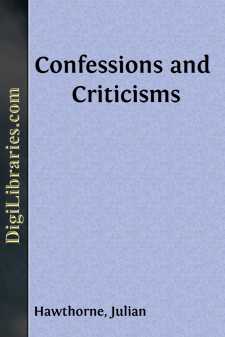Categories
- Antiques & Collectibles 13
- Architecture 36
- Art 48
- Bibles 22
- Biography & Autobiography 813
- Body, Mind & Spirit 142
- Business & Economics 28
- Children's Books 17
- Children's Fiction 14
- Computers 4
- Cooking 94
- Crafts & Hobbies 4
- Drama 346
- Education 46
- Family & Relationships 57
- Fiction 11829
- Games 19
- Gardening 17
- Health & Fitness 34
- History 1377
- House & Home 1
- Humor 147
- Juvenile Fiction 1873
- Juvenile Nonfiction 202
- Language Arts & Disciplines 88
- Law 16
- Literary Collections 686
- Literary Criticism 179
- Mathematics 13
- Medical 41
- Music 40
- Nature 179
- Non-Classifiable 1768
- Performing Arts 7
- Periodicals 1453
- Philosophy 64
- Photography 2
- Poetry 896
- Political Science 203
- Psychology 42
- Reference 154
- Religion 513
- Science 126
- Self-Help 84
- Social Science 81
- Sports & Recreation 34
- Study Aids 3
- Technology & Engineering 59
- Transportation 23
- Travel 463
- True Crime 29
Confessions and Criticisms
by: Julian Hawthorne
Description:
Excerpt
CHAPTER I.
A PRELIMINARY CONFESSION.
In 1869, when I was about twenty-three years old, I sent a couple of sonnets to the revived Putnam's Magazine. At that period I had no intention of becoming a professional writer: I was studying civil engineering at the Polytechnic School in Dresden, Saxony. Years before, I had received parental warnings—unnecessary, as I thought—against writing for a living. During the next two years, however, when I was acting as hydrographic engineer in the New York Dock Department, I amused myself by writing a short story, called "Love and Counter-Love," which was published in Harper's Weekly, and for which I was paid fifty dollars. "If fifty dollars can be so easily earned," I thought, "why not go on adding to my income in this way from time to time?" I was aided and abetted in the idea by the late Robert Carter, editor of Appletons' Journal; and the latter periodical and Harper's Magazine had the burden, and I the benefit, of the result. When, in 1872, I was abruptly relieved from my duties in the Dock Department, I had the alternative of either taking my family down to Central America to watch me dig a canal, or of attempting to live by my pen. I bought twelve reams of large letter-paper, and began my first work,—"Bressant." I finished it in three weeks; but prudent counsellors advised me that it was too immoral to publish, except in French: so I recast it, as the phrase is, and, in its chastened state, sent it through the post to a Boston publisher. It was lost on the way, and has not yet been found. I was rather pleased than otherwise at this catastrophe; for I had in those days a strange delight in rewriting my productions: it was, perhaps, a more sensible practice than to print them. Accordingly, I rewrote and enlarged "Bressant" in Dresden (whither I returned with my family in 1872); but—immorality aside—I think the first version was the best of the three. On my way to Germany I passed through London, and there made the acquaintance of Henry S. King, the publisher, a charming but imprudent man, for he paid me one hundred pounds for the English copyright of my novel: and the moderate edition he printed is, I believe, still unexhausted. The book was received in a kindly manner by the press; but both in this country and in England some surprise and indignation were expressed that the son of his father should presume to be a novelist. This sentiment, whatever its bearing upon me, has undoubtedly been of service to my critics: it gives them something to write about. A disquisition upon the mantle of Nathaniel Hawthorne, and an analysis of the differences and similarities between him and his successor, generally fill so much of a notice as to enable the reviewer to dismiss the book itself very briefly. I often used to wish, when, years afterwards, I was myself a reviewer for the London Spectator, that I could light upon some son of his father who might similarly lighten my labors. Meanwhile, I was agreeably astonished at what I chose to consider the success of "Bressant," and set to work to surpass it in another romance, called (for some reason I have forgotten) "Idolatry." This unknown book was actually rewritten, in whole or in part, no less than seven times....











